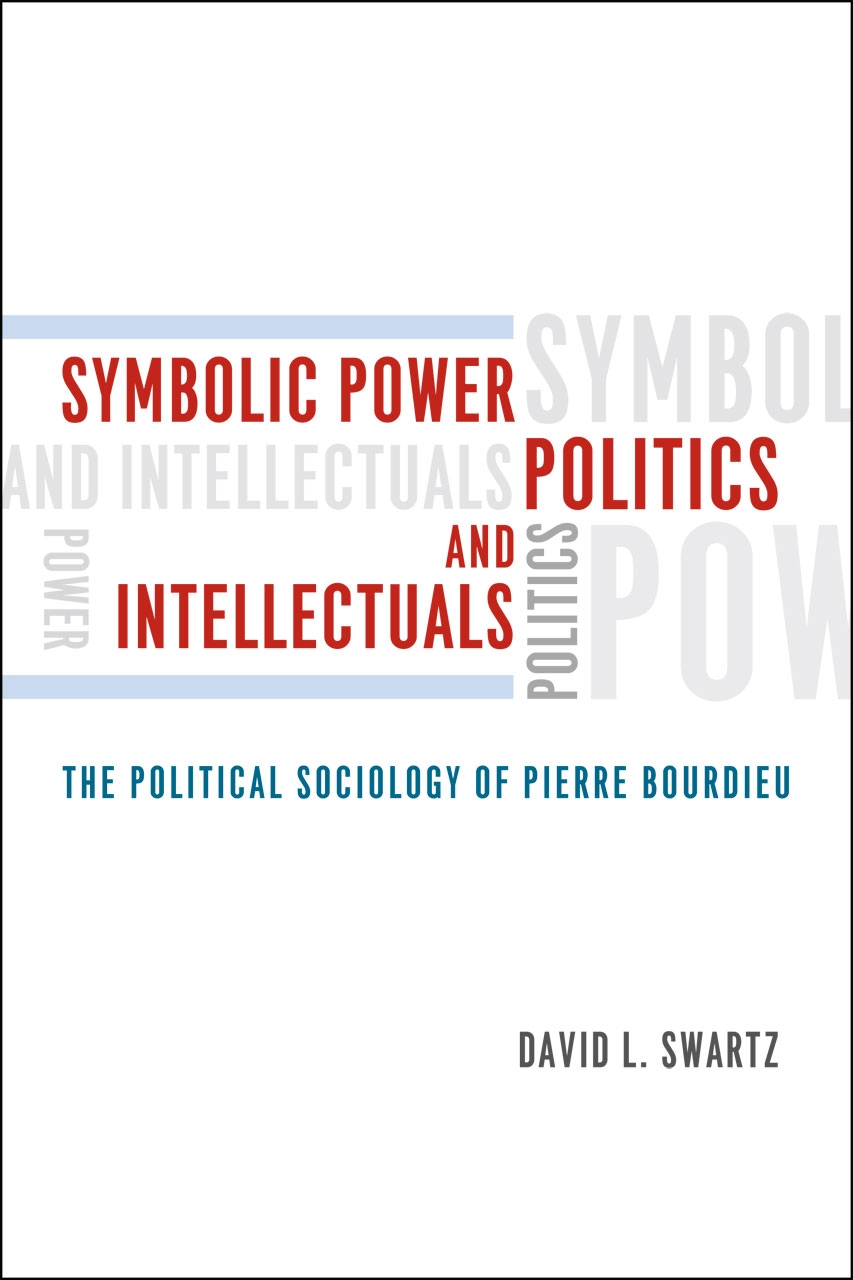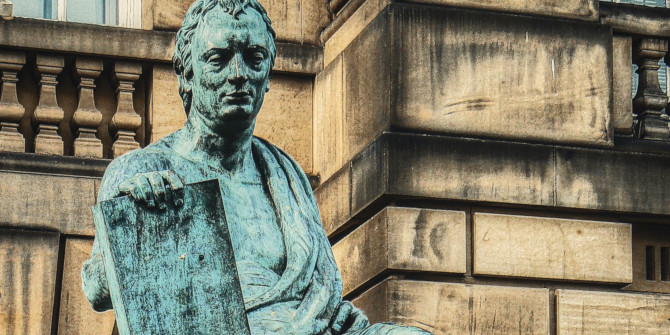 Power is the central organising principle of all social life, from culture and education to stratification and taste. And there is no more prominent name in the analysis of power than that of Pierre Bourdieu. In Symbolic Power, Politics, and Intellectuals, David L. Swartz delves into Bourdieu’s work to show how central – but often overlooked – power and politics are to an understanding of sociology. This book can be regarded as a superb piece of analysis, as well as a great read, and one which successfully sheds light on a neglected aspect of Bourdieu’s work, concludes Luke McDonagh.
Power is the central organising principle of all social life, from culture and education to stratification and taste. And there is no more prominent name in the analysis of power than that of Pierre Bourdieu. In Symbolic Power, Politics, and Intellectuals, David L. Swartz delves into Bourdieu’s work to show how central – but often overlooked – power and politics are to an understanding of sociology. This book can be regarded as a superb piece of analysis, as well as a great read, and one which successfully sheds light on a neglected aspect of Bourdieu’s work, concludes Luke McDonagh.
 Symbolic Power, Politics and Intellectuals: The Political Sociology of Pierre Bourdieu. David L. Swartz. University of Chicago Press. May 2013.
Symbolic Power, Politics and Intellectuals: The Political Sociology of Pierre Bourdieu. David L. Swartz. University of Chicago Press. May 2013.
In this new, highly readable book, David L. Swartz aims to highlight what he describes as the inherently political nature of Pierre Bourdieu’s sociology, something which he claims has been neglected in most studies of Bourdieu. According to Swartz, Bourdieu had a dual vision: first, he saw sociology as being a type of ‘scientific’ examination of power relations in society (something which he acknowledges has been well documented), and second, Bourdieu saw sociology as being a type of political engagement in itself, something which Swartz argues has been missed by a great deal of political sociologists and political scientists. In fact, Swartz argues that Bourdieu himself rejected the academic division between sociology, political sociology and political science, and Bourdieu’s own sociology does not neatly fit these categories.
The first chapter, entitled ‘Reading Bourdieu as a Political Scientist’, makes Swartz’s view on this point crystal clear. The first sentence of the chapter notes that power is a ‘central organizing feature of all social life’. Bordieu’s principal fascination was with power, and for him power is tied to an idea of ‘the political’.
Nevertheless, it is important, as Swartz notes, to understand what we mean by ‘the political’ with respect to Bourdieu. Swartz remarks:
“Bourdieu did not devote much attention to political parties, voting, lobbying, electoral campaigns, government administration, legislatures, or social movements”
Instead, we must see ‘the political’ as a broad category capable of incorporating the way power is exercised in society in ways that conserve, and potentially challenge, prevailing power arrangements and social hierarchies. As Swartz notes, for Bourdieu the term politics concerns ‘the structures and exercise of power’.
Bourdieu’s most well known theory, the idea that power is expressed within, and between differing, competing ‘fields’, is outlined in detail in chapter three. In order to understand this theory, it is necessary to understand what Bourdieu means by the terms ‘field’ and ‘capital’. As is the case with a great many sociologists, the greatest challenge in reading and understanding the work is in mastering the terminology, or jargon, inherent within the theory. Thankfully, Swartz is a clear thinker and a good writer – he explains the key terms to the reader briefly and comprehensively.
‘Fields’ for Bourdieu are ‘power arenas’ – spaces where power is exercised in a number of different ways. Agents occupy ‘positions’ within these fields – these positions are aimed at maintaining or transforming the power relations that are constitutive of the fields. The term ‘capital’ within this concept is a wide-ranging one, and it includes a number of forms of power resources, including ‘cultural’ capital and ‘social’ capital. Swartz explains that Bourdieu saw concentrations of various capitals in particular arenas of struggle, such as ‘the field of power, the political field and the state’. For Bourdieu, different ‘fields’ compete and struggle over the available ‘capitals’ (power resources). In particular, he argued that they compete to gain access to the political field, and eventually to state power. Examining the way these struggles are resolved, and understanding the multiplicity of ways these resolutions can be misunderstood, is key for Bourdieu.
In the later chapters of this excellent tome, Swartz focuses on the notion of ‘symbolic power’ and what this means for Bourdieu, including how this concept works in relation to politics and the state. Notably, Swartz examines how power, and ‘symbolic violence’ (another one of Bourdieu’s terms), is maintained in societies ‘where the most authoritarian and crudest techniques of coercion have been replaced with persuasion, consent, choice, influence, and negotiation’. In other words, for Bourdieu power remains central to social and political life. The role of the intellectual in this context is of great importance in this respect – those intellectuals who are engaged in critical sociology must remain vigilant to the existence of ‘symbolic power’, and continually acknowledge it, even where the forms of power have changed and become more (apparently) benign within society, something particularly evident within ‘developed’ economies.
According to Swartz, it is at this point that Bourdieu’s political engagement comes to the fore. Above all, Swartz argues that Bourdieu maintained to the end of his life the principle that such a critical understanding of power does not merely explain the nature of the existing power relations within society – such an understanding can also be used to pursue the enactment of changes to these power relations in the realm of politics. In other words, Bourdieu was not content to merely document, in a scientific sense, the power conflicts which occur between different ‘fields’ – he also saw the possibilities for engaging with this power, and of using this engagement to transform society. In the final part of the book, Swartz convincingly outlines this argument, and thus makes good on his initial claim, stated in the introduction, to illuminate the political nature of the sociology of Pierre Bourdieu. Overall, this book can be regarded as a superb piece of analysis, as well as a great read, and one which successfully sheds light on a neglected aspect of Bourdieu’s work.
Please read our comments policy before commenting.
Note: This article gives the views of the author, and not the position of EUROPP – European Politics and Policy, nor of the London School of Economics.
Shortened URL for this post: http://bit.ly/17wBM3O
_________________________________
 Luke McDonagh – Cardiff University
Luke McDonagh – Cardiff University
Luke McDonagh is a Lecturer at Cardiff University. He was previously a Fellow in the LSE Department of Law. Luke holds a PhD from Queen Mary, University of London (2011), an LLM from the London School of Economics (2006-7) and a BCL degree from NUI, Galway (2002-05). He has previously taught in the areas of Public Law, Administrative Law and EU Law at Queen Mary as well as Constitutional Law and Tort Law at NUI Galway.




